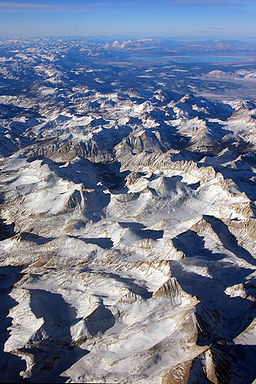Sierra Crest
| Sierra Crest | |
| Ridgeline | |
|
The Mills Creek cirque (center) is part of the Sierra Crest, which extends across mounts Abbot and Mills on the southeast rim (right). Northward from the cirque along the right of the image's centerline is the crest's Red and White Mountain, the triple watershed point for the Middle and South Forks San Joaquin River with the Owens River. The crest extends northwest to Mammoth Crest and Mammoth Mountain and then west of Mono Lake (top, blue) in the north, e.g., across Tioga Pass west of the Wheeler Crest.
|
|
| Country | United States |
|---|---|
| State | California |
| Endpoints | North: Fredonyer Pass, South: Tehachapi Pass |
| Highest summit Highest pass Highest road pass |
Mount Whitney Trail Crest Tioga Pass (CA 120) |
The Sierra Crest is a ~500 mi (800 km) generally north-to-south that demarcates the broad west and narrow east slopes of the Sierra Nevada (U.S.) and that extends as far east as the Sierra's topographic front (e.g., Diamond Mountains and Sierran escarpment). The northern and central Sierra Crest sections coincide with over 300 mi (480 km) of the Great Basin Divide, and the southern crest demarcates Tulare and Inyo counties and extends through Kern County to meet the Tehachapi crest. The Sierra Crest also forms two paths (bifurcates) around endorheic cirques (e.g., Cup Lake) between the west and east Sierra slopes.
Theodore Solomons made the first attempt to map a crest route along the Sierras. He was instrumental in envisioning, exploring, and establishing the route of what became the John Muir Trail from Yosemite Valley along the crest of the Sierra Nevada to Mount Whitney.
...
Wikipedia

